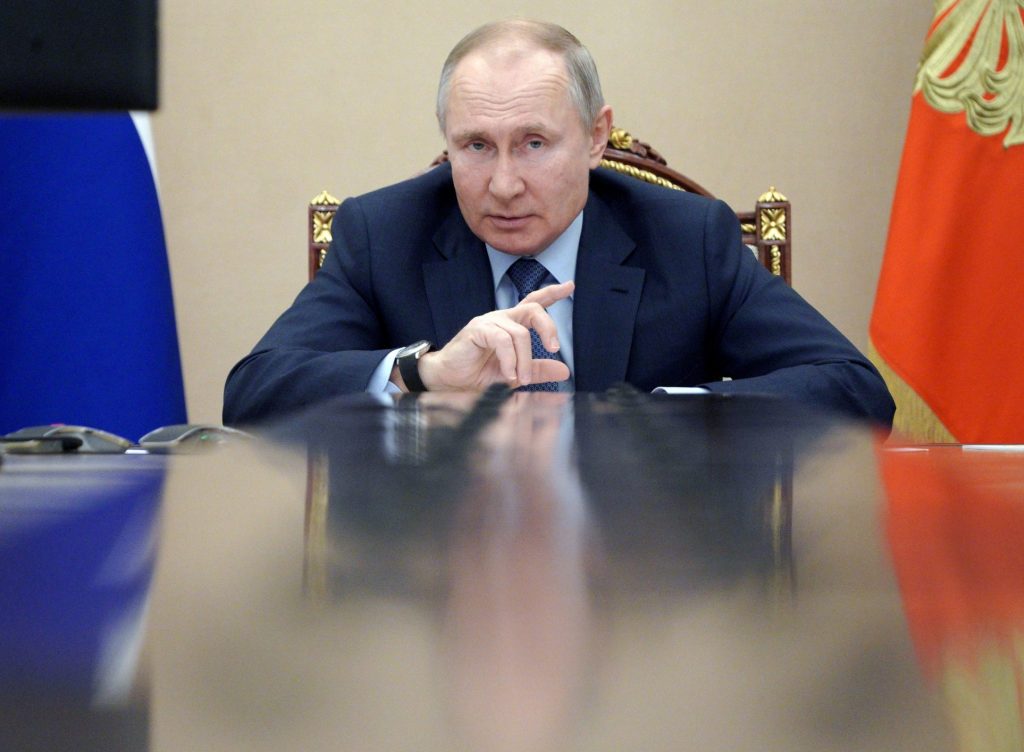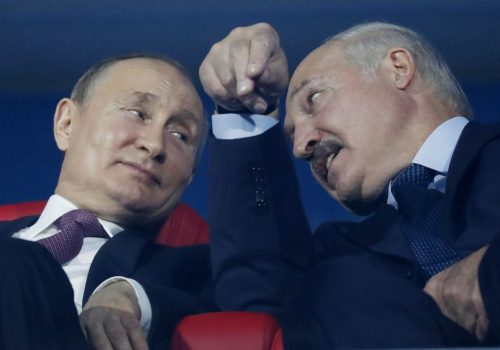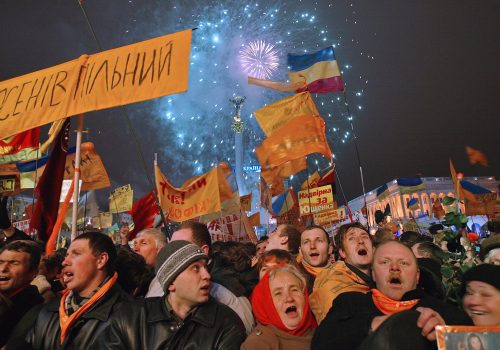Former Ukrainian president Leonid Kravchuk has confirmed that Ukraine will seek to move peace talks with Russia away from Minsk as the international fallout from Belarus dictator Alyaksandr Lukashenka’s recent act of air piracy continues to make waves throughout the region.
Kravchuk heads Ukraine’s delegation to the Trilateral Contact Group, which brings together representatives from Russia, Ukraine, and the OSCE as part of efforts to find a diplomatic solution to the conflict in eastern Ukraine.
Following its creation in summer 2014 during the initial stages of the Russo-Ukrainian War, the TCG has met periodically in the Belarusian capital. However, since August 2020, the suitability of Minsk as a neutral venue has been thrown into question by an unprecedented nationwide protest movement in Belarus that has left Lukashenka increasingly isolated and reliant on Russia for his political survival.
As Lukashenka has tied his fate to the Kremlin, relations with Ukraine have deteriorated accordingly. The latest blow came earlier this week, when Kyiv joined other European capitals in cutting aviation ties with Belarus following the May 23 forced landing of an EU passenger jet in Minsk.
Belarusian officials stand accused of staging a fake terrorist bomb scare and grounding an Athens-Vilnius flight traveling through Belarusian airspace in order to detain Belarusian dissident journalist Raman Pratasevich. The move sparked widespread condemnation and led to unusually robust countermeasures from the EU along with a host of other countries including Ukraine.
Speaking as the freeze on air traffic came into force, Kravchuk said Belarus was fast becoming a Russian satellite and argued that the flight ban was one more reason to seek an alternative venue for ongoing negotiations with the Kremlin. “We no longer have flights to Belarus, so we will not even be able to get there,” he commented. “Given the current situation and the dictatorial behavior demonstrated by self-proclaimed President of Belarus Lukashenka, it is clear that we cannot even consider Minsk as the site for further negotiations. We will definitely look for a new venue.”
Kravchuk said Ukraine would now consult with fellow TCG members over possible new platforms for talks, but there appears to be little chance of any consensus on the issue. Russia quickly moved to dismiss talk of a change in venue, with Russian Foreign Minister Sergei Lavrov expressing his hope that fellow Minsk Agreement signatories France and Germany would join him in turning down Ukraine’s request.
Stay updated
As the world watches the Russian invasion of Ukraine unfold, UkraineAlert delivers the best Atlantic Council expert insight and analysis on Ukraine twice a week directly to your inbox.
Ukraine’s rejection of the Belarusian capital as a suitable host city leaves the future of the entire peace process in doubt. Efforts to implement the 2015 Minsk Agreement have been stalled for a number of years amid fundamental disagreements between Ukraine and Russia over the sequencing of key steps including the holding of local elections in Kremlin-occupied eastern Ukraine and the return of the international border to Ukrainian control.
Prior to the outbreak of anti-regime protests in Belarus last summer, Lukashenka had been careful to avoid siding with the Kremlin in its attack on Ukraine. Conscious of his own vulnerability to revanchist Russian expansionism, the Minsk strongman refused to recognize the 2014 seizure of Crimea and even mocked Moscow’s historic claims to the Ukrainian peninsula by arguing that according to such logic, Russia itself should be returned to the Mongols.
There has been little sign of this bravado in recent months as an increasingly servile Lukashenka has sought Russia’s help to prevent the collapse of his regime. Putin has obliged, providing his Belarusian colleague with a financial lifeline and dispatching planeloads of propaganda specialists to Minsk, while also publicly promising to deploy Russian security forces across the border if necessary to restore order.
Eurasia Center events

Putin has continued to back Lukashenka in the wake of Sunday’s forced airline diversion. While he has avoided public statements, senior Kremlin officials have been critical of Western outrage over the incident. Foreign Ministry spokesperson Maria Zakharova described the Western response as “shocking,” while Lavrov defended the Belarusian actions as an “absolutely reasonable approach.”
The Kremlin appeared to double down in its support for the beleaguered Lukashenka on Thursday when it began blocking EU flights from entering Russian airspace. This apparent tit-for-tat move in response to EU measures against Belarus saw Moscow reject an Air France flight from Paris and an Austrian Airlines service from Vienna. Both carriers had submitted revised flight routes to the Russian authorities that bypassed Belarus in line with EU Aviation Safety Agency recommendations.
Russia’s decision to begin penalizing EU airlines was widely interpreted as an indirect but unambiguous indication of Moscow’s stance. Veteran German politician Norbert Roettgen, who chairs the Bundestag Foreign Affairs Committee, spoke for many when he tweeted: “Putin shows full solidarity with Lukashenka. EU airlines avoiding Belarusian airspace are now banned from entering Russian airspace. If you still had doubts whether Putin at least tolerates Lukashenka’s state terror, this is your answer.”
The Kremlin’s uncompromising position should come as no surprise. While there is thought to be no love lost between Putin and Lukashenka on a personal level, the Russian ruler cannot allow a fellow post-Soviet dictator to be ousted by popular opposition or lectured by the West. Putin remains haunted by the Soviet collapse and he will go to any lengths to prevent a repeat of the pro-democracy uprisings that brought down the USSR three decades ago. This makes Putin’s continued support for Lukashenka non-negotiable and raises the stakes considerably as the West seeks to punish the Belarus dictator.
Peter Dickinson is Editor of the Atlantic Council’s UkraineAlert Service.
Further reading
The views expressed in UkraineAlert are solely those of the authors and do not necessarily reflect the views of the Atlantic Council, its staff, or its supporters.

The Eurasia Center’s mission is to enhance transatlantic cooperation in promoting stability, democratic values and prosperity in Eurasia, from Eastern Europe and Turkey in the West to the Caucasus, Russia and Central Asia in the East.
Follow us on social media
and support our work
Image: Russian President Vladimir Putin has provided his Belarusian counterpart Alyaksandr Lukashenka with vital support since the outbreak of a pro-democracy protest movement in Belarus in August 2020. (Sputnik/Alexei Druzhinin/Kremlin via REUTERS)




